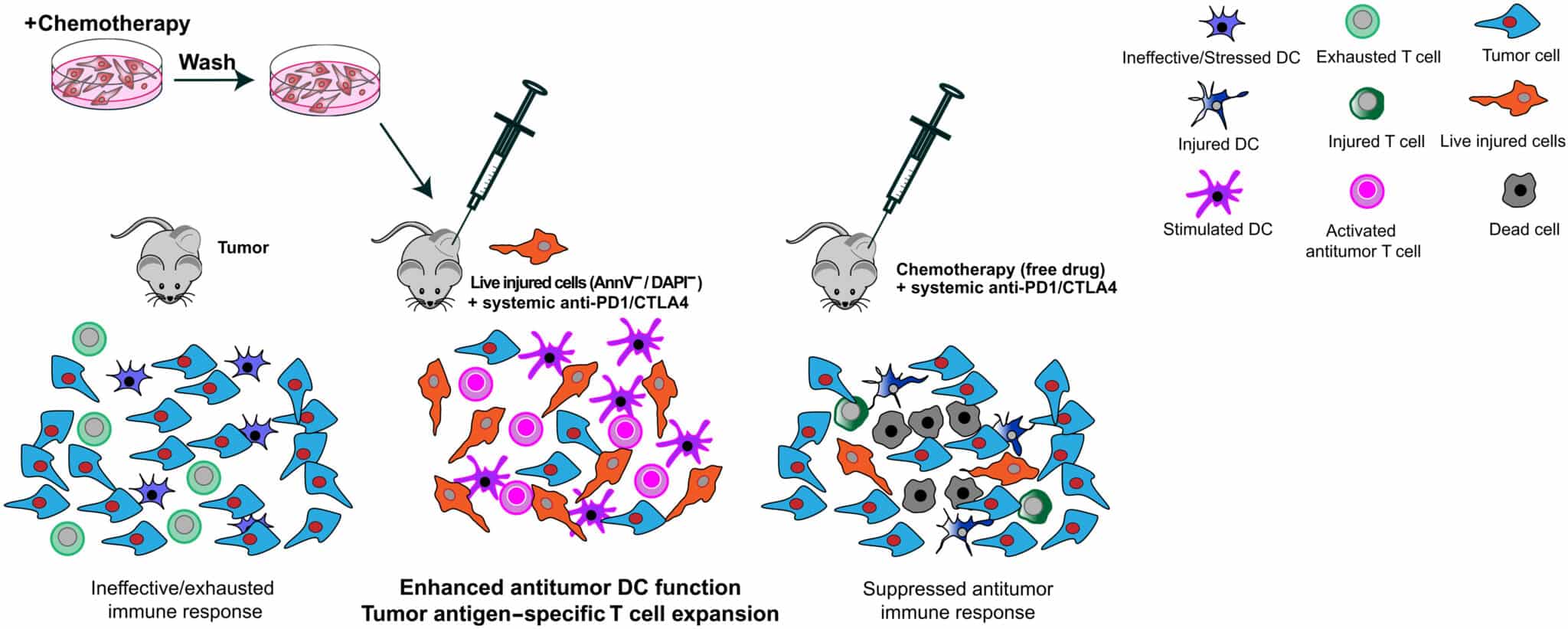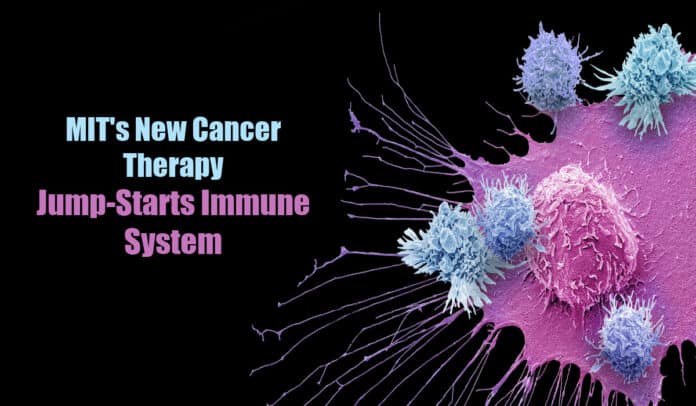MIT’s New Cancer Treatment Shows That Injured Cancer Cells Can Supercharge Immune System To Kill The Tumor
By integrating immunotherapy, tumor injury, and chemotherapy, scientists find that the immune system can be employed to kill tumors present in mice.
Immunotherapy is a prospective approach to treat cancer by activating the immune system of the human body which destroys cancer cells, however, it is successful just for a few cancers. Scientists from MIT have recently unearthed a novel means to trigger the immune system to fight tumors, allowing the usage of immunotherapy for multiple cancer types.
MIT’s new cancer treatment comprises the removal of cancer cells from the body, chemotherapy of these cells, and finally their placement back in the original tumor. When introduced together with drugs that induce T cells, these injured tumor cells function as a distress signal that stimulates the T cells into action.
A Member of Koch Institute for Integrative Cancer Research, MIT, Director of CPCM (Center for Precision Cancer Medicine), and a David H. Koch Professor of science, Michael Yaffe stated that when cells with defective DNA are created, those which survive under specific conditions are capable of sending a signal that activates the immune system
In rodent studies, scientists discovered that this treatment can fully destroy tumors in almost half of the rodents.
Koch Institute’s Associate Director and Professor (Underwood-Prescott) with appointments in Engineering & Material Science and Biological Engineering departments, MIT, Darrell Irvine, and Yaffe are the senior writers of the article, which is published in Science Signaling. The main authors of the article are Ph.D. ’21, Lauren Milling and MIT postdoc, Ganapathy Sriram.
T cell activation
One class of medicines lately employed for the treatment of cancer is checkpoint blockade inhibitors. It activated the T cells that are unable to destroy cancer cells and which are exhausted. These medicines have worked well in treating some cancer types, however, are not successful for a few others.

Yaffe and his teammates tried to ameliorate the effects of these medicines by mixing them with cytotoxic chemotherapy medicines hoping that chemotherapy can activate the immune system to eliminate tumor cells. This strategy is based on a process referred to as immunogenic cell death, wherein the dying or dead tumor cells transmit signals that attract the attention of the immune system.
Many clinical studies involving both immunotherapy and chemotherapy drugs are afoot, however it is not fully clear about the ideal method to mix these two kinds of therapy.
The research team from MIT started treating tumor cells with many different doses of chemotherapy medicines. Scientists introduced dendritic cells to all dishes 24 hours after the therapy and then after another 24 hours, they added T cells. Afterward, they quantitated the potential of T cells to destroy tumor cells. Surprisingly, they discovered that majority of the chemotherapy medicines did not work well. And those which were successful worked at low doses but did not destroy many cells.
The scientists then noticed the reason behind this finding: It was not dead cancer cells that were awakening the immune system. On the other hand, the important thing was that the cells survived even after getting injured by chemotherapy.
Yaffe stated that this elucidated the novel concept of immunogenic cell injury instead of immunogenic necrosis for cancer therapy. They demonstrated that if tumor cells are treated in a dish, directly introduced to the tumor, and offered checkpoint blockade inhibitors, the injured, live cells were those which activated the immune system.
The medicines that seem to work well with this strategy are medicines that cause damage to DNA. The scientists discovered that when there is damage to the tumor cells’ DNA, it awakens cellular pathways that react to stress. These pathways transmit distress signals that activate T cells to leap into action and kill both nearby tumor cells and damaged cells.
Yaffe claimed that their discoveries fit well with the idea that cellular danger signals can react with the immune system, a proposal developed by NIH’s Polly Matzinger in the year 1990s, even though it is still not globally acknowledged.
Tumor destruction
In rodent studies involving breast tumors and melanoma, the scientists demonstrated this therapy destructed tumors fully in 40% of the rodents. Moreover, when the scientists introduced tumor cells into these same rodents many months afterward, their T cells remembered and killed them prior to forming any new tumors.
Additionally, the scientists attempted introducing DNA-injuring drugs straight into cancers, rather than treating them externally. However, they discovered that this was not successful as the chemotherapy medicines additionally damaged nearby T cells & other immune cells. And introducing the damaged cells devoid of checkpoint blockade inhibitors had a very low impact.
Yaffe mentioned that anything that functions as an immunostimulant has to be introduced, however, the preexisting obstruction on the immune cells has to be released.
Yaffe intends to assess this strategy in individuals whose cancers have not reacted to immunotherapy, however, more exploration is required initially to ascertain the doses and medicines, which are beneficial for various kinds of tumors. Additionally, scientists are thoroughly studying the mechanism of injured cancer cells in stimulating such a strong T cell response.
The study was funded partially by the Majorie & Charles Holloway Foundation, the MIT CPCM, the Mazumdar-Shaw International Oncology Fellowship, and the NIH (National Institutes of Health).
MIT’s New Cancer Treatment



